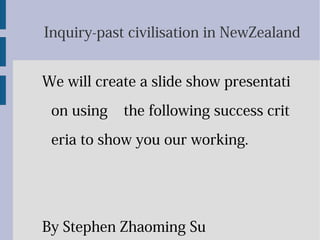Inquiry where we are in place and time
- 1. Inquiry-past civilisation in NewZealand We will create a slide show presentati on using the following success crit eria to show you our working. By Stephen Zhaoming Su
- 2. History of Maori in NewZealand To be presented in a Timeline highlighti ng all the significant past events.
- 7. Causes and Effects of the Treaty of Waitangi ŌŚÅ Displayed in a Graphic organiser-format from Mr s Fletcher. ŌŚÅ Consider all causes and effects of the Treaty of W aitangi. The Treaty of WaitangiCause s Maories afraid the French may take over, they want British to protect them. There's no governme nt in NewZealand to manage the public. To help relations of NewZealand a nd stop fighting. To help them trading and to establish an agreement between two cultures. Land sold in a disorganised way and they have to solve this situation. Effect s It improves NewZealand and the Europe country are independent, and it stops some wars betwee n countries. That brings the Eur opeans and Maoris live together in a peaceful place. It stops fighting and let Europeans and Maoris live together and change two diffe rent cultures into a culture, it changes t he whole relations of Europeans and Maor is
- 8. Maori Adaptations ŌŚÅ How did Maori have to adapt to European wa ys? Because the Europeans came and they occupy Maori's place, and the way they live is being popular. They have to adapt European's eating, clothing, cooking, speaking, etc. ŌŚÅ Do you think it was fair? I think it is fair in some ways and it is unfair in some ways. B ecause the Europeans occupy and Maori had no dominion
- 9. Maori Adaptations Think of 2 other FAT questions to ask that wil l help your understanding of Maori lifestyle s. ŌŚÅ Show a brainstorm of the lifestyles that Maori have to adapt European ways. Eating, clothing, living(house), language(speaking), people's r elationship and conversation, timetable, communication, tr affic, living environment, etc.
- 10. Maori lifestyles This a Maori village: In the picture, the whole Maori village are havin g a meeting, they are deciding everyone's worki ng. Some of them are carrying the water, some o f them are hunting, and some of them are getting the wood. They are very happy because now is summer an d they can find lots of foods, they can play crazil y and have party at night. They have freedoms that no one is managing the m, they just get things to live and have no rules, constraints and troubles, they lived like the origi nal human. Maori's lifestyles and culture is different to now and European's. A written form of the Maori language was also c reated for the Maoris by the Missionaries, and gr adually the Maori culture became something co mpletely different than before.
- 11. What about today? How do the past events effect our lives toda y? ŌŚÅ We live in a peaceful place ŌŚÅ There's still Maori live in our place and the essential of Maori culture survive to now ŌŚÅ NewZealand is a independent country now










